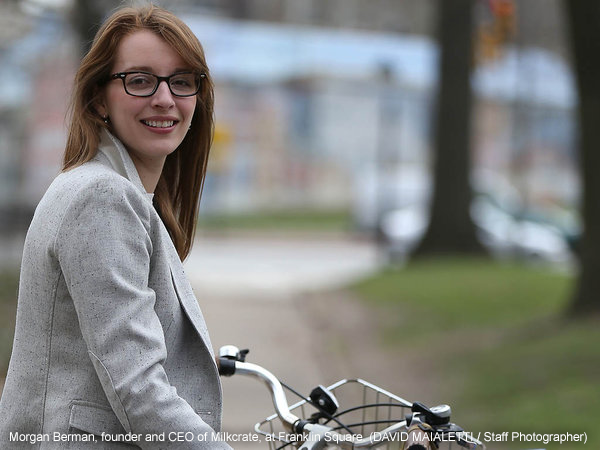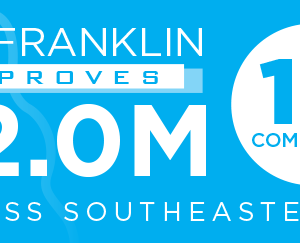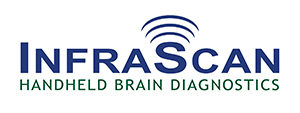Milkcrate helps people wanting to live green
Source: Philly.com
In those cash-strapped days when you first moved into your own place and used plastic milk crates as furniture, you might not have considered yourself part of the sustainability movement. But you were, by repurposing that crate.
 A few years ago, Morgan Berman decided she, too, wanted to live a greener existence.
A few years ago, Morgan Berman decided she, too, wanted to live a greener existence.
“I kept thinking, ‘I want to make these life choices,’ but I didn’t know how,” the 29-year-old Philadelphia resident recalled.
So she developed an app, Milkcrate, to help her and other like-minded consumers connect with local sustainable businesses and other resources.
Through the app, the related website, the company newsletter, and social media, the start-up has connected with more than 20,000 people and attracted more than $120,000 in investments since its debut in August, Berman said.
Milkcrate started as a project for her master’s thesis on sustainable design at Philadelphia University. Three months after graduation, Berman launched the free app, described in full at mymilkcrate.co.
The app connects viewers to a database of more than 3,000 green businesses in the Philadelphia area, representing more than 20 lifestyle categories – such as baby products and services, bicycle shops, and restaurants serving locally sourced foods. The information is offered in list and map format.
This is a big week for the bare-bones company, whose logo is a bicycle with a milk crate on the back or, as Berman called it, “your receptacle for your sustainable urban lifestyle.” Likewise, her company’s app is a digital receptacle for such living.
Apple approved a new version of the app Wednesday, with availability expected by Saturday. Milkcrate 2.0 (for iOS and Droid) provides full business profiles, including photos, and “badges” of the sustainable organizations to which the companies belong or hold certifications.
It also offers enhanced search options and enables users to “favorite” businesses. Listed for free in the database, businesses will have a fee-based option ranging from $250 to $2,500 a year to upgrade to premium accounts for maximum exposure.
That revenue-generation ability will help ease Berman’s conscience over not being able to pay her seven-person staff thus far, she said. They do have equity stakes. Funds raised to this point have gone toward product development, legal fees, and marketing.
Milkcrate would not disclose revenue projections, used only “for internal exercise between us and our investors,” said spokeswoman Caitlin Honan.
A $50,000 investment in March by Ben Franklin Technology Partners of Southeastern Pennsylvania is helping pay for development of Milkcrate 2.0 and its commercialization, said Omar Mencin, director of investment partnerships at the economic development agency. He also manages Ben Franklin’s involvement in the Project Liberty Digital Incubator, which accepted Milkcrate in November. The company is hosted by Interstate General Media, owner of The Inquirer.
An additional $71,000 has been raised from a variety of investors, including $20,695 through an Indiegogo crowdfunding campaign that exceeded its goal by 3 percent.
Pooja Ganesan of Philadelphia has invested $30,000 because “Milkcrate differentiates itself from other sustainability or lifestyle apps by targeting a niche growing population and developing strong partnerships within the sustainability sector.”
“Just as importantly, from an investor perspective, it has the potential to scale,” Ganesan said. For instance, this month, after Milkcrate 2.0 goes live in Philadelphia, apps customized for use in Denver and Boulder, Colo., and Asheville, N.C., will be available, Berman said.
Invaluable national exposure came in part from Milkcrate’s selection from more than 100 start-ups to be among five to pitch at the inaugural Forbes Under 30 Summit in Philadelphia last October, Berman said.
Milkcrate’s database is fed by two streams – partner organizations, such as the Sustainable Business Network of Greater Philadelphia (SBN), Fair Food, Delaware Valley Green Building Council, and B Corp., and online submissions. The latter are vetted by Forsei Consulting, a social and environmental consulting firm in Philadelphia.
“Our city’s aims to become the greenest in America has resulted in sustainability being not a high-minded concept, but something that is introduced to people where they live,” said Jamie Gauthier, executive director of SBN. “Milkcrate is an amplifier of all of that positive activity, because the app will inform while also helping consumers connect to sustainable businesses and initiatives with ease. It is also a strong example of the spirit of innovation that is practically bursting out of Philadelphia.”





